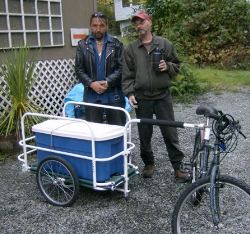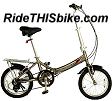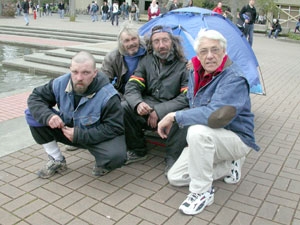Temporary, Low Cost Homeless Solution
Combination Bike Tent Cargo Trailer Offers Shelter & More
by Philippe Lucas
One of the challenges in addressing homelessness is that the street population is made up of many different individuals with different needs, goals and abilities. Even when both shelter space and social assistance are available, there remains a segment of the homeless population that refuses to engage these services, preferring autonomy to charity or shelter, and choosing modest income generation rather than government assistance.
A Short-term, Compassionate, Community-based Homeless Solution
Recognizing that even the most autonomous of our street population deserve support, the MOTHERS Project is an effort to provide short-term shelter for 25 members of the street population in Victoria, British Columbia.
Mobile, Bike Based Trailer/Shelters
 The project focus is to distribute a unique bicycle tent-cargo trailer to individuals that do not currently use shelter space. Produced by Tony's Trailers (www.tonystrailers.ca), a few of these trailers have already been distributed to members of our homeless population who are using them both as shelter (the trailers, pictured below, fold out into a one-person tent), and for income generation ranging from binning (collecting recyclables from industrial garbage bins), to compost collection, to messenger services. 25 tent-trailers will be distributed over a three month period; 15 will also come with a used bicycle.
The project focus is to distribute a unique bicycle tent-cargo trailer to individuals that do not currently use shelter space. Produced by Tony's Trailers (www.tonystrailers.ca), a few of these trailers have already been distributed to members of our homeless population who are using them both as shelter (the trailers, pictured below, fold out into a one-person tent), and for income generation ranging from binning (collecting recyclables from industrial garbage bins), to compost collection, to messenger services. 25 tent-trailers will be distributed over a three month period; 15 will also come with a used bicycle.Tracking Project Performance
Prior to distributing the trailers, a quality of life assessment will be performed with each participant. The assessment will be re-administered four weeks later to identify statistically significant changes and to assess the overall success of the project. Additionally, two community seminars on this project will be organized by MOTHERS coordinators. These meetings will bring together the public, press, policy-makers, homeless, service and health providers, and university-based researchers to discuss homelessness, poverty, and the economic and environmental benefits of binning. During the first seminar, the project will be introduced to the public; during the second seminar, the results of this project will be shared and discussed.
Community Based, Professionally Administered Project
This is a community-based project, and the recruiting and actual distribution of these bike tent- cargo trailers would be done through the Committee to End Homelessness in Victoria, a highly experienced volunteer group of individuals that include members of Victoria's homeless population as well as their allies in the community. The proposal calls for the distribution of these bicycles to take place at a rate of eight per month for three months, with 1/3rd of the units being made available to aboriginal applicants. The modest pace of implementation will allow the project administrators and the general public to observe and address any project impact on street people as well as the overall community.
Low Cost, Immediate Solution
Although broad-based, long-term solutions are necessary to address the ever-growing social justice and public health issue that is homelessness, providing short-term shelter to those with the greatest immediate need and the opportunity for this group to earn a legitimate income justifies the one time, $26,000 cost of the MOTHERS program.
Philippe Lucas
MOTHERS Project Administrator
Graduate Research Fellow - Center for Addictions Research of B.C.
Labels: homelessness, Philippe-Lucas, Tony-Hoar










